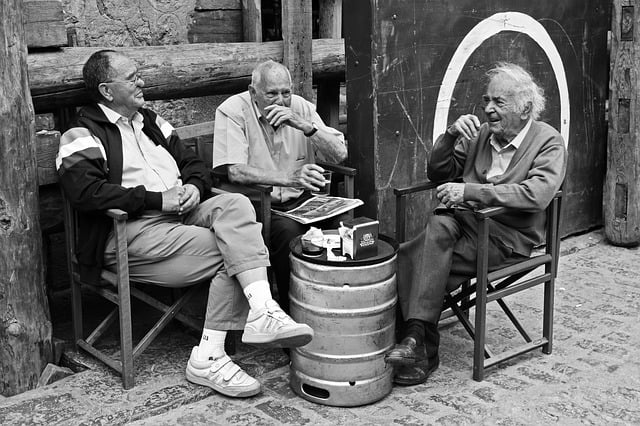¡Qué risa!: Ten Spanish expressions to talk about laughing like a local

Spaniards are a happy bunch who don’t hold back on laughing or talking about times they were in stitches. These expressions should help you navigate the language that’s used in comical situations in Spain.
Have you ever received this text message from a Spanish friend - “ja ja ja” - and not known what they meant by it initially? This is of course the Spanish version of ‘ha ha ha’ as phonetically the j in Spanish sounds like an h in English.
But not all Spanish expressions relating to laughing are so straightforward, with everything from dying, breaking body parts and toilet habits entering the conversation during funny moments.
Here’s a variety of Spanish expressions, some ruder than others, which will help you know what to say during hilarious situations or when talking about them later on.
¡Qué risa!
Let’s start with the basics. If you find something funny (gracioso), because it is indeed comical (hace gracia), this will make you laugh (reir) and that sound of joy that comes out of your mouth is called risa (laughter).
¡Qué risa/s!” is what Spaniards will shout out while laughing about something they’ve found very funny or when recalling it. Depending on the tone, it can also be used in an ironic way to imply that something isn’t funny at all.
Example: ¡Qué risas anoche! Hacía tiempo que no me reía tanto.
What a laugh last night! It had been a while since I laughed so much.

Who doesn't need some risas (laughter) in their life? Photo: Maia Habegger/Unsplash
Descojonarse
Cojón, one of the most common ways to refer to a testicle in Spanish, is widely considered to be the word in Spanish with most derivative meanings. Descojonarse, which sounds a bit like it has something to do with removing one’s testicle, is a slightly vulgar but widely used way to say to crack up with laughter. You can also talk about something being descojonante, a bit like saying something is bloody hilarious.
Example: Me descojoné cuando me contaste ese chiste!
I cracked up when you told me that joke!
Ataque de risa
It may sound like a medical condition, but if you get un ataque de risa it means that you’re having a fit of laughter.
Example: A veces no puedo aguantar la risa pero esta vez ha dado un ataque de risa.
Sometimes I can’t stop myself from laughing but this time I had a fit of laughter.

Have you ever suffered 'un ataque de risa'? Photo: Dave Moreno/Unsplash
Reírse a carcajadas
A carcajada is the word for a loud laugh in Spanish, so if you say reírse a carcajadas it means to roar with laughter or to laugh out loud. Incidentally, young people in Spain don’t have a Spanish acronym to replace LOL (Laugh Out Loud) but do use the English version.
Example: Cuando le ví estaba con sus amigos riéndose a carcajadas.
When I saw her she was with her friends laughing out loud.
Troncharse de risa
Here’s one of the most common and ‘cleanest’ ways to say that you’re laughing your head off about something. You can use troncharse by itself as a reflexive verb without de risa and it’s understood what you mean by it. Alternatively, the verb desternillarse (de risa) can be used in exactly the same way.
Example: Nos tronchamos con las historias de John.
John’s stories have us rolling over with laughter.

Is 'troncharse de risa' (laughing one's head off) the secret to a long, happy life? Photo: Ainara Oto/Unsplash
Mearse de risa
In its literal sense, this means to pee yourself laughing. And because Spaniards often verbally defecate on many things in informal speech (the prostitute, the milk, the salty sea), there’s also an even more vulgar version of this expression which is cagarse de risa (to crap oneself laughing). It’s not uncommon either to hear Spaniards say “me meo” (I’m peeing myself) when something has them in stitches.
Example: ¡Es un cómico magnífico, nos meamos de risa!
He’s a great comedian, we peed our pants laughing!
Llorar de risa
A milder way to say in Spanish that something cracked you up is to say that it made you cry with laughter - llorar de risa - just the same as in English.
Example: Lloramos de risa con su disfraz de carnaval.
He had us in tears with his carnaval costume.

Is there a friend you have who always makes you llorar de risa (cry with laughter)? Photo: Daniel Nebreda/Pixabay
Morirse de risa
Seeing as laughter can cause all manner of bodily fluids to be metaphorically expelled during laughter, Spaniards take their assessment of funny situations one step further and may also die from laughter. The verb is morirse de risa and the adjective is muerto de risa.
Example: El público estaba muerto de risa con tus chistes sobre el Brexit.
The audience was dying with laughter with your jokes about Brexit.
Partirse de risa/la caja/el pecho/el culo/la polla
To break oneself with laughter, or to crack your box, chest, bum or dick (in the same order as above), are all very common ways of saying to roll around laughing. It’s also common for Spaniards to just say “me parto” while they’re laughing at something.
Example: ¡Cuando hablas con esa voz, me parto de risa!
When you talk with that voice, it cracks me up!
¡Qué vacilón!
A vacilón is a person or situation which is funny and non-serious, because there’s plenty of guasa (joking around).
A get-together with friends which leads to plenty of risas (laughs) because everyone is mucking about or clowning around (hacer el payaso) can be described as un vacilón.
Example: ¡Qué vacilón en la cena de empresa! Hasta el jefe estaba haciendo breakdance.
Fun times at the company dinner! Even the boss was breakdancing.
Comments
See Also
Have you ever received this text message from a Spanish friend - “ja ja ja” - and not known what they meant by it initially? This is of course the Spanish version of ‘ha ha ha’ as phonetically the j in Spanish sounds like an h in English.
But not all Spanish expressions relating to laughing are so straightforward, with everything from dying, breaking body parts and toilet habits entering the conversation during funny moments.
Here’s a variety of Spanish expressions, some ruder than others, which will help you know what to say during hilarious situations or when talking about them later on.
¡Qué risa!
Let’s start with the basics. If you find something funny (gracioso), because it is indeed comical (hace gracia), this will make you laugh (reir) and that sound of joy that comes out of your mouth is called risa (laughter).
¡Qué risa/s!” is what Spaniards will shout out while laughing about something they’ve found very funny or when recalling it. Depending on the tone, it can also be used in an ironic way to imply that something isn’t funny at all.
Example: ¡Qué risas anoche! Hacía tiempo que no me reía tanto.
What a laugh last night! It had been a while since I laughed so much.

Descojonarse
Cojón, one of the most common ways to refer to a testicle in Spanish, is widely considered to be the word in Spanish with most derivative meanings. Descojonarse, which sounds a bit like it has something to do with removing one’s testicle, is a slightly vulgar but widely used way to say to crack up with laughter. You can also talk about something being descojonante, a bit like saying something is bloody hilarious.
Example: Me descojoné cuando me contaste ese chiste!
I cracked up when you told me that joke!
Ataque de risa
It may sound like a medical condition, but if you get un ataque de risa it means that you’re having a fit of laughter.
Example: A veces no puedo aguantar la risa pero esta vez ha dado un ataque de risa.
Sometimes I can’t stop myself from laughing but this time I had a fit of laughter.

Reírse a carcajadas
A carcajada is the word for a loud laugh in Spanish, so if you say reírse a carcajadas it means to roar with laughter or to laugh out loud. Incidentally, young people in Spain don’t have a Spanish acronym to replace LOL (Laugh Out Loud) but do use the English version.
Example: Cuando le ví estaba con sus amigos riéndose a carcajadas.
When I saw her she was with her friends laughing out loud.
Troncharse de risa
Here’s one of the most common and ‘cleanest’ ways to say that you’re laughing your head off about something. You can use troncharse by itself as a reflexive verb without de risa and it’s understood what you mean by it. Alternatively, the verb desternillarse (de risa) can be used in exactly the same way.
Example: Nos tronchamos con las historias de John.
John’s stories have us rolling over with laughter.

Mearse de risa
In its literal sense, this means to pee yourself laughing. And because Spaniards often verbally defecate on many things in informal speech (the prostitute, the milk, the salty sea), there’s also an even more vulgar version of this expression which is cagarse de risa (to crap oneself laughing). It’s not uncommon either to hear Spaniards say “me meo” (I’m peeing myself) when something has them in stitches.
Example: ¡Es un cómico magnífico, nos meamos de risa!
He’s a great comedian, we peed our pants laughing!
Llorar de risa
A milder way to say in Spanish that something cracked you up is to say that it made you cry with laughter - llorar de risa - just the same as in English.
Example: Lloramos de risa con su disfraz de carnaval.
He had us in tears with his carnaval costume.

Morirse de risa
Seeing as laughter can cause all manner of bodily fluids to be metaphorically expelled during laughter, Spaniards take their assessment of funny situations one step further and may also die from laughter. The verb is morirse de risa and the adjective is muerto de risa.
Example: El público estaba muerto de risa con tus chistes sobre el Brexit.
The audience was dying with laughter with your jokes about Brexit.
Partirse de risa/la caja/el pecho/el culo/la polla
To break oneself with laughter, or to crack your box, chest, bum or dick (in the same order as above), are all very common ways of saying to roll around laughing. It’s also common for Spaniards to just say “me parto” while they’re laughing at something.
Example: ¡Cuando hablas con esa voz, me parto de risa!
When you talk with that voice, it cracks me up!
¡Qué vacilón!
A vacilón is a person or situation which is funny and non-serious, because there’s plenty of guasa (joking around).
A get-together with friends which leads to plenty of risas (laughs) because everyone is mucking about or clowning around (hacer el payaso) can be described as un vacilón.
Example: ¡Qué vacilón en la cena de empresa! Hasta el jefe estaba haciendo breakdance.
Fun times at the company dinner! Even the boss was breakdancing.
Join the conversation in our comments section below. Share your own views and experience and if you have a question or suggestion for our journalists then email us at [email protected].
Please keep comments civil, constructive and on topic – and make sure to read our terms of use before getting involved.
Please log in here to leave a comment.